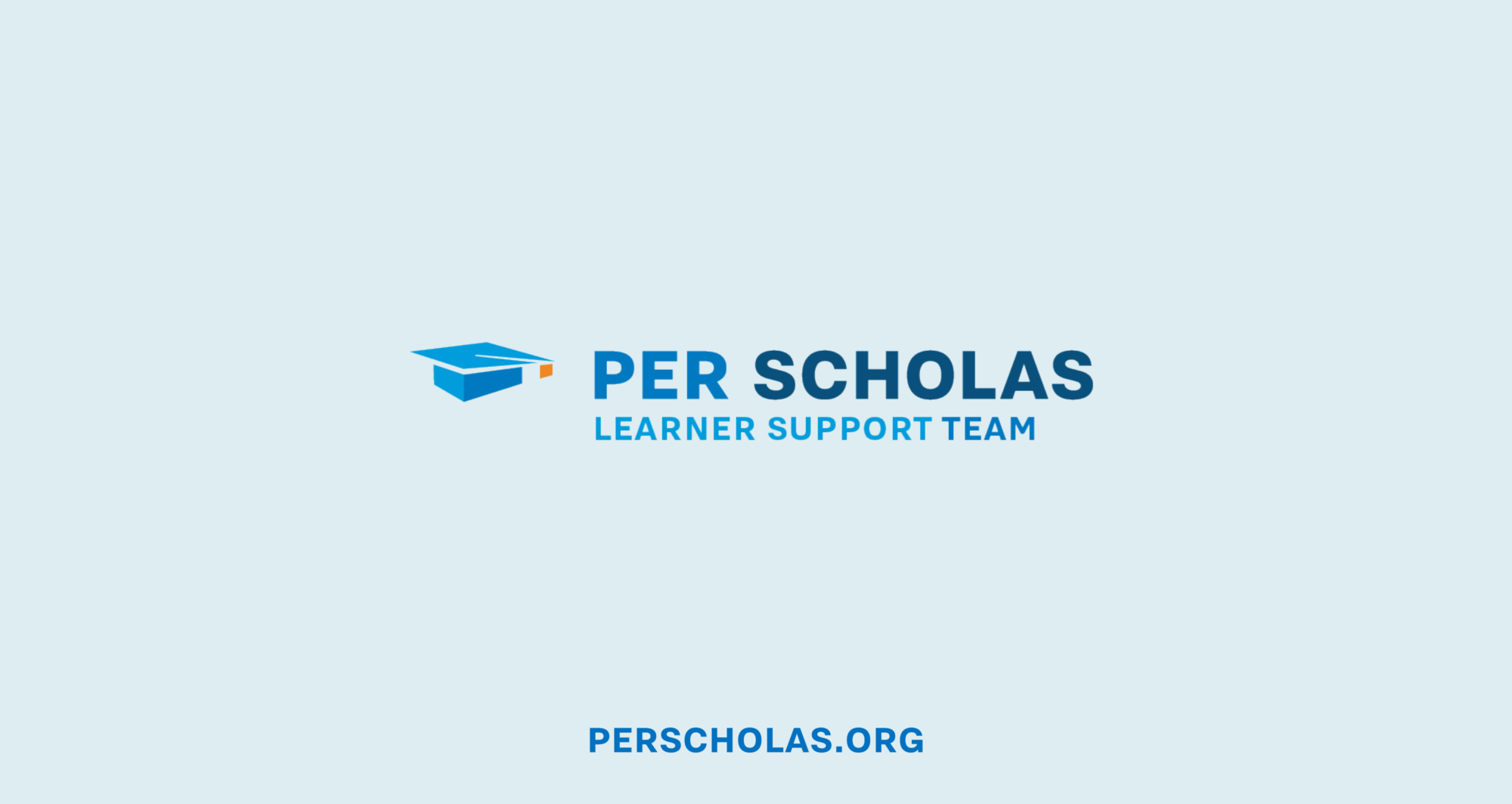How Women In Tech Are Launching Their Careers
It is discouraging that there are far fewer women involved in IT and tech-related fields than there are men. The latest study by the AnitaB.org Institute found that women make up just 28.8 percent of the tech workforce. Tech, like other STEM fields, has historically had a reputation of being “for the boys,” and women face many barriers to entry, including workplace discrimination, unequal pay, and a lack of female tech role models to inspire them. Plus, the pandemic continues to negatively impact women in the workforce, and women of color in particular. Thus, even well-qualified women may be discouraged from entering the field — a detriment not only to those women but to technology as a whole.
Why It Matters & What Can Be Done to Fix Gender Inequity in Tech
Per Scholas is committed to changing the narrative for women in tech. By encouraging and providing opportunities to women learners, Per Scholas is working toward greater gender equity in the tech industry.
To encourage women’s involvement in tech, women need to know that success is possible for them in the field, and to see other women thriving in tech positions. “Success in the field is not based on just intellect; it’s based on exposure,” said Carla Davis, a 2020 graduate of Per Scholas Boston’s AWS re/Start course. “Hopefully, I can be some kind of example for others, but it was extremely difficult to get my foot in the door. The instructors and courses at Per Scholas showed me that if I worked hard, it is possible to get the certifications and get the jobs.”

Why Women Thrive in Tech
There is an aspect of support and flexibility that empowers women in the workforce to succeed and do well in their roles. Women are usually caretakers of their household, mothers, and chief operating officers of their homes, which calls for support from their employers in ways beyond financial support. We know that when women have flexible hours, remote work location flexibility, support for caregiving and child care, they are able to provide for themselves and their families and better focus on their careers and training at Per Scholas.
Per Scholas Scholarships & Grants for Women in Tech/IT
With generous support from partners, Per Scholas has been able to make real progress in improving the gender balance of our learners. Per Scholas has enrolled more than 1,800 women learners since the start of the pandemic in 2020, and it’s a number that only continues to grow.
Last fall, Per Scholas was selected as one of five recipients for the Women in Apprenticeship and Nontraditional Occupations grant, presented by U.S. Secretary of Labor Marty J. Walsh. “For too long, women have faced barriers to gaining entry into apprenticeships and nontraditional careers,” Secretary Walsh said at the grant presentation. “As we work to build back a better economy, these grants will empower women to get the training and support they need to secure good-paying jobs and pathways into the middle class. They are an important and effective tool for creating a more inclusive and equitable workforce.”

Women in Software Engineering (WISE) Apprenticeship
As a result of this grant, Per Scholas has launched a new Women in Software Engineering (WISE) Pre-Apprenticeship training track from our National Capital Region (NCR) Campus in the Washington, D.C. metropolitan area. With additional support from Capital One, The Boeing Company, and Montgomery County Economic Development Corporation, our first pilot cohort is launching this month. “We have the opportunity to learn so much from our WISE learners,” said Diane Duff, Per Scholas National Capital Region Managing Director. “We’ve received generous support to adjust our already proven model to more effectively address the unique challenges facing women who want to enter the tech industry.”
It is incredibly powerful to see our efforts pay off. In 2021, more than 35% of Per Scholas learners identify as women, an increase from the previous year. “I have noticed that there are a lot fewer women in tech than there are men,” said Soma Majumder, a 2021 graduate of Per Scholas New York’s IT Support cohort. “But from my experience, I didn’t feel that there was any barrier when I entered the tech industry; I think a lot of that had to do with Per Scholas and how adamant they were in getting us placed in jobs. I think that I was really lucky to have my career coach and the business solutions team there because they really pushed for me and were really active in helping me get a job.”
COVID-19 Recovery for Women in Tech
This International Women’s Day, the Franklin County Board of Commissioners in Columbus, Ohio, committed to developing the county workforce to meet a growing demand for technology jobs by voting unanimously to approve a more than $4.5 million COVID-19 recovery grant to support the new Tech Women of Color workforce training initiative at our Per Scholas Columbus campus.
“We are grateful to the Franklin County Board of Commissioners for providing us the opportunity to be of service to our community, and to our local partners who will come alongside us as we seek to make a transformative impact in this county,” stated Jenn Fowler Howard, senior director of the Tech Women of Color Alliance at Per Scholas. “We recognize that this project will not only change the lives of the women who participate but will also build stronger families, communities, and businesses for years to come.”

Looking to The Future: More Women Learners
We are excited to see the heights our women learners will reach in the coming years as we continue to strive to achieve a more gender-balanced tech workforce. Women can succeed in tech, and we are committed to providing the tools and opportunities for more and more of them to do so.
“I gained so much from my experience with Per Scholas,” Per Scholas Philadelphia alumna Susan Tabassum reflected on her experience in the program. “It reinforced the knowledge I already had in technology, I gained a lot of new skills, and, most importantly, it gave me the confidence to pursue a career in technology, which is what I’ve always wanted.”
How to Set Goals That Will Help You Succeed
In general, setting goals is an integral part of life. Creating individual goals can help you outline a path to obtaining a long-term vision and provide motivation and guidance throughout the process. Goal-setting is one of the many exercises in which a mentor’s direction can benefit. We gathered a small list of Per Scholas’ mentors’ most essential tips to help you set and accomplish your goals.

1. Start with small goals.
Get your foot in the door by setting and accomplishing small, achievable goals. These will help you build up the habit of setting and meeting goals without feeling too overwhelming right off the bat. Regularly achieving these small goals can help you gain the momentum, motivation, and confidence you need to make the jump to bigger, more complex goals successfully.
2. Adopt some behavioral micro-habits.
Like small goals, micro-habits are small, simple tasks that allow you to break down the components of a more prominent goal behavior into tiny, achievable parts. Micro-habits never last longer than 3-5 minutes, but they are mighty! These habits aim to assimilate small, proactive behaviors into your daily life to the point where they become a habit, cumulatively achieving your overall goal. If, for example, your overall goal behavior is to become more organized, you can adopt some quick micro-habits as simple as making your bed in the morning, hanging your jacket up when you get home, rather than throwing it on that chair, planning out your next day the night before, etc. Setting micro-habits can grow the confidence and ability to achieve more necessary life goals and behaviors. Starting small instead of making drastic life changes feels much more achievable and can help you build the consistency that will help you achieve your overall goal behaviors.
3. Set your aim and get started! Remember that your goals may change and grow with you.
Setting goals that will tangibly impact your future can feel stressful and daunting. However, it is essential to understand that your goals will change and evolve with you. This does not mean that you failed to accomplish your original goals. Instead, it means that you learned enough in the process to grow and develop your plans. Coming up with your first set of goals doesn’t have to be an overly arduous process, but it is crucial to have a starting point to work from. Monitoring the growth of your goals over time will allow you to look back on your progress and set the launching pad that you can build from. As Kelsey Briggs, Per Scholas Chicago’s Senior Manager of Business Solutions put it: “as you learn more about yourself and your field, [your goals] may change. But, you can’t see where you’ve come from, where you’re going, or even know if you’re on the right track if you don’t set those first goals.”

4. Set SMART Goals
The goals you set for yourself must be clear and achievable. Vague, overly-aggressive, or poorly-framed goals are a quick recipe for frustration and disappointment. “SMART goals” is a system designed to help you set the framework for success by crafting goals that are clear, trackable, and carefully planned. The components of SMART stand for: Specific, Measurable, Achievable, Relevant, and Timely. In a nutshell, you want to ensure that your goals are realistically accomplishable, as clear and specifically-defined as possible, relevant to your overall values and interests and that your progress can be measured in some way and completed within an ideal time frame. Setting up the framework to define and achieve your goals is a foolproof first step in the process of accomplishing your goals. Plan out your goals, follow your plan, and you will set yourself up for success.
5. Be Intentional.
To achieve your goals, you have to be mindful of your actions, time, and effort. Achieving goals is a significant accomplishment, and it can be done by following the plan that has already been set. Remind yourself of the big picture, keep your goals close to you, and don’t forget to check in with yourself to make sure you are following your plan and that you are on the right track to success. It is equally crucial to be kind to yourself when you are not following your plan. Goal-achievement is not always a straight line; if you find you are slipping, remind yourself why you have chosen to follow this path and what the benefits of success will be. Everyone has off days, and it is essential not to let them overwhelm you. If achieving your goals was easy, these tips would not be necessary! Forgive yourself for slipping and identify what specifically caused you to do so. Reassess and make changes to your technique if necessary, recommit yourself to the end goal, and get back on track!
With these tips in mind, you should be ready to start setting and working towards your goals! Remember to be realistic and intentional with the goals you set and to hold yourself accountable for your progress. Everyone has to start somewhere, and even the smallest goals can be an important stepping stone to bigger things.
A Mentor’s Role in a Learner’s Life
A career mentor’s role in a student’s life is highly significant. A mentor is someone who guides a learner throughout their journey to break the barriers that might stand in their way to success.
Per Scholas offers supplemental mentorship to all its learners in addition to their training. Our mentors are career coaches, financial coaches, and instructors, all of whom believe that maintaining an open line of communication with our learners is essential to their success. But how exactly are mentors influencing our learners’ experiences not only during their time at Per Scholas but also after graduating? How are our learners prepared to navigate a job market that grows continuously and becomes more demanding every day? Hear from some of our Per Scholas’ mentors about the benefits, activities, and advice for career success.
How Mentors Help Learners
One of the many ways a career mentor can help our learners is by ensuring that they are equipped with proper knowledge and skills necessary to be marketable in the workforce, as well as enhance confidence in areas that learners might feel incompetent in, and accommodate time outside traditional class to provide a more personal learning experience.

Mentorship can be as broad or as specific as learners need it to be. One way Kelsey Briggs (Senior Manager, Career Solutions, Chicago) provides mentorship is by sharing information about job market opportunities in the area and also offering feedback to learners about their job search materials, networking, and communication skills.
“We guide them through their next career move, salary negotiation, and even when the right time is to move on to a new opportunity.”
It is also important to remember that the relationship between mentor and mentee, in this case, our learners, is a safe, free of judgment space, and encourages learners to share their personal challenges and create an effective plan of action. “I focus on mentoring my learners with my life expertise and best professional practices. I also hold one on one meetings with my learners, and together we create an effective plan to address them,” shares Jose Jurado (Senior Manager, Career Advancement, New York).
What to do as a Mentor
It is essential to understand what activities learners can participate in with their job mentors during the mentoring process. Our mentors in Boston and Detroit agree that having a set time to connect and check in regularly is fundamental to building a fruitful relationship between mentor and learner. Equally important is to talk openly. Honest feedback is one of the many benefits of mentorship. However, this can only be effective if there is an open communication line between the career mentor and the learner. As Kelsey Briggs explains: “As we get to know each other, we can offer information on how others might perceive us, how we could get ahead, or how we can reach our goals. The mentor/mentee relationship isn’t fixed, either. A strong relationship will have you sometimes offering advice and sometimes receiving it.”

Other suggested activities include role-playing, which can be beneficial during the interview process when looking for a job, setting reasonable expectations, providing career focus direction, and networking activities. Many other activities can be part of your job mentor’s relationship; these will depend on what you need, what you are looking for, and where you stand in your career at the time.
The Importance of Digital Upskilling and Reskilling
In a competitive job market with many shifting gears from The Great Resignation, there is more focus on employees to upskill and reskill in their industry to become greater experts in the field.
When it comes to technology, Per Scholas not only trains our learners to become skilled technologists, but we also offer digital upskilling and reskilling opportunities that support our corporate partners with top-tier candidates for their organizations.
In this article, we will cover what digital upskilling and reskilling is, why it is important in the tech industry, and what courses Per Scholas provides for such skills. Read on to find out how Per Scholas can help you navigate the great resignation and move your career forward.
What is Digital Upskilling?
Digital upskilling refers to the process of acquiring new digital skills to enhance one’s existing skill set.
For example, if a technologist has basic coding skills, they may want to upskill by learning a new programming language like Python or JavaScript, or they may want to acquire new skills in web development, cloud computing, or data analytics. Digital upskilling can help individuals stay up-to-date with emerging trends and technologies, increase their marketability, and boost their career growth. Per Scholas offers advanced technology courses in cybersecurity and IT Support for learners and alumni.
Upskilling vs Reskilling: What’s the Difference?
Digital upskilling refers to the process of acquiring new digital skills to enhance your current expertise, such as learning a new programming language or mastering a new software tool that builds on your current experience. For example, a marketer might upskill by learning how to use data analytics tools to better understand customer behavior.
On the other hand, reskilling involves learning an entirely new set of skills to switch to a different job or career. For example, a factory worker might need to reskill to become a software developer.
In short, upskilling is about enhancing your current skills, while reskilling is about acquiring new skills for a new job or career.
Why is Digital Upskilling Important in the Tech Industry?
The industry is ever-evolving and simply put; the more you know, the more you grow. From a business perspective, it is alluring to hire individuals who are eager to learn more or have previously done so to further their careers.
Luckily, Per Scholas prepares our learners for thriving tech careers with these opportunities.
Per Scholas Digital Upskilling Opportunities

Navigating the Great Resignation with Customized Training
Throughout The Great Resignation, Per Scholas has been able to navigate the new industry challenge and help our enterprise clients through our customized digital upskilling training and reskilling courses.
Our Chief Enterprise Solutions Officer Damien Howard was recently invited to serve on a panel at The Big Exit Conference and spoke on how Per Scholas is helping companies win the War on Tech Talent:
“We’re all facing a war on talent amid the Great Resignation, so the opportunity is right in front of us to make diverse, equitable, and inclusive hiring decisions that will push business — and bottom lines — forward,” Damien mentioned during his panel discussion.
Not only are we providing strong tech talent for our partners, but a diverse group of technologists that will bolster Diversity, Equity, and Inclusion efforts for corporations.
The IT industry is struggling with diversity, where only 40% of the IT workforce is diverse today and only 26% is women. There is limited supply and high demand for diverse candidates, which is what Per Scholas has worked to bridge a gap in the workforce.
A study conducted by the Boston Consulting Group (BCG) identified diversity as a key driver of innovation, finding that diverse teams produce a minimum of 19% more revenue
A Digital Upskilling Success Story: Maria Patokina
Per Scholas graduate Maria Patokina took advantage of one of our upskilling courses that advanced her coding capabilities. After successfully completing her initial course in March 2021, Maria did not have a job lined up, so she felt it was important for her to continue learning and gain certifications.
Maria enrolled in the Google IT Automation with Python Alumni training course. “The Python certification helped a lot in several ways,” she reflected. “Taking this certification course helped me better understand general coding principles and other languages, like Javascript.”
After completing the course in May 2021, Maria realized that the new certification made her a standout candidate in her job search. She soon began her first tech job as a Software Engineering intern at a leading corporation.
Maria credits the certification for improving her coding skills and creating a habit of self-studying that she feels is important in the IT field. “I learned a lot in a short period of time with Per Scholas that prepared me with a lot of practical, hands-on experience,” Maria said about her experience.
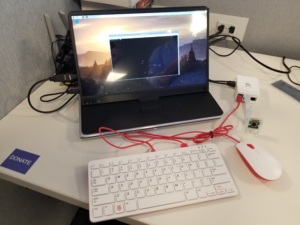
Start Your Digital Upskilling and Reskilling Journey
With so many different avenues to go down in the tech field, upskilling and reskilling opportunities are pertinent for both companies and employees.
Per Scholas’ alumni training courses that have been customized for our partners are one way to defeat the Great Resignation we have recently faced in America and a great opportunity for organizations to strengthen their DEI ties.
Data has shown that 87 – 90% of our learners are people of color and about 30% of that number identify as women, further proving we’re a turnkey solution for enterprises looking to diversify their technology talent immediately – with customized courses and opportunities for our graduates to continue towards success as technologists.
For more information, visit our upskilling opportunities page. For questions about diversifying your tech talent pipelines with our incredible talent, set up a discovery meeting to discuss how we can work together and move the needle around diversity, digital transformation, and superior tech talent within your firm.
Financial Planning Tips
Per Scholas is dedicated to connecting our learners with tuition-free tech training designed to launch them into thriving tech careers. Upon completion of training, our graduates are often able to take on roles that allow them to earn a higher income than in their previous employment, as well as access new financial opportunities. Per Scholas is unique because we not only provide tech training to our learners, but we also offer them the services of financial coaches to help with financial planning and wealth management. We tapped into the expertise of our financial planners to obtain their top five tips for financial planning.
As part of our Learner Support Team, Per Scholas’s financial coaches are available to guide our learners and provide advice on all manner of finance-related matters, from saving money to budgeting and more. Our financial coaches are dedicated to helping our learners navigate their individual financial situations, as well as setting our learners up for future success in taking their financial planning to the next level.
1. Consider Your Financial Needs
Financial planning is not a cookie-cutter, one-size-fits-all approach. To start budgeting and saving money, you need to consider what is important to you and why. Beyond basic necessities, each person will have their own things that are important to them to allocate money for. Furthermore, depending on factors such as where a person lives, the size of their family, etc., even planning for necessities will vary by situation. A financial plan that works excellently for one individual may not be applicable at all to another person.
It is necessary to remain open to new ideas when considering your own financial needs. This will allow you to make better plans and decisions about managing your finances. It is also important to understand that you may need to make some difficult financial decisions and sacrifices in order to achieve financial freedom. In financial planning, Brenda Badger, Per Scholas’s Senior Manager of Financial Coaching stated that “the most important thing is to be willing to learn and have an open mindset to adopt new habits, processes, and information learned.”

2. Create emergency savings, then save for anything else
When we spoke with our financial coaches, all of them had the same advice when it came to what percentage of your income to save: there is no set percentage that works for everyone, but it is very important to first create emergency savings. “Prioritizing emergency savings is a critical part of a sound financial plan,” Brenda emphasized. Once you have created emergency savings, you can then make sure your income outweighs your expenses and determine a reasonable percentage of your paycheck to save each month. We found more money-saving tips from The Penny Hoarder that show how small changes make a significant impact on your savings.
One way to free up money for your savings that you already have is to consider regular expenses. For example, think about what monthly subscriptions you have and if you are able to cut back on any of those. What about daily coffee runs? Perhaps you are able to reduce your coffee shop visits and save money by brewing at home. Saving money doesn’t necessarily mean you have to significantly diminish your spending on things that you do, but try compartmentalizing your finances so that you can precisely see where you are able to make adjustments. Do you currently have an emergency savings fund? If so, how did you build it, and what, if any, changes did you make to your regular spending habits in order to do so?
3. Create a budget based on your income and goals
How does one start a budget? What may seem like a big task can actually be exciting! Here are some top budgeting tips from Per Scholas’s financial coaches!
- Track all of your spending for one week and use that as a starting point for your budget. It’s important to know where your money is going and how to strategize around reducing debt, saving for big purchases, and investing in your retirement.
- Create a list of all the things you spend money on (bills, fun, transportation) and calculate the amount you think you pay every month. Track your expenses over a month and compare what you think you spend to what you actually spend. Adjust the amounts, so they reflect what is really happening and what you want to happen.
- Budgeting is something that should be done before spending so that there is a plan in place and you know your needs are covered, your goals are addressed, and your wants are permitted.
- Start with your income and include your fixed and variable expenses. Factor in your emergency savings, your future goals, and a miscellaneous category for the unexpected.
- Make your budget match your paycheck schedule. If paid bi-weekly, your budget should be divided into two groups to coincide with the two paychecks you receive each month.
- Track your progress and reward yourself when you reach milestones!

4. Make SMART financial goals
You should handle your financial goals as you would any other goals and make sure they are SMART – Specific, Measurable, Attainable, Relevant, and Time-Bound. Per Scholas Financial Coach Manager Janell Pollard gave great insight with the example of a particular goal of buying a car. “I think it is important to set yourself up for success by testing out things before you commit,” Janell advised. “If you think you can afford a $350 [per month] car payment, practice saving that amount for six months. If you can do it comfortably, you can probably afford the car payment, and you can use the six months of savings (350 x 6 = 2,100) as a down payment. If not, you just saved yourself from making a financial decision you probably couldn’t afford.”
Consider each of your financial goals. Write them down, then break them down. For example, if one of your goals is to put money into a savings account, consider amplifying this goal to be a SMART goal. Review the SMART questions posed above and consider how these questions apply to the goal of saving money. How much do you want to save? When do you want to have that amount saved? How much will you put away monthly in order to reach that goal in the time you allotted? Are you able to achieve this goal without compromising your current finances? With relevance to your life, how will this goal help you? These are all ways to consider your goals and strengthen your ability to meet them in the time needed. What are some of your SMART financial goals?
5. Find a financial planner to map out your wealth management and money goals.
A final tip for financial planning is to connect with a financial advisor that works well for you. Brenda suggested, “find a Financial Coach you trust and gel well with. Simply having this type of professional in your corner to inform you, support you, and cheer you on might be the boost your finances have been waiting for!” Remember to keep an open mind and be open to new ideas that may be challenging to implement but worthwhile for your future!
Budgeting your money and planning for your finances is necessary, but it does not have to be a daunting task. Our Per Scholas learners are fortunate to have access to excellent financial coaches from our Learner Support Team, who help learners navigate their finances during and beyond their time at Per Scholas. “Per Scholas offers a lot of services to help the learners manage their finances,” recalled Ivan Reyes, who graduated this year from Per Scholas Boston’s IT Support course. “I really was able to take advantage of it, and I’m very grateful for it. It’s good to have that extra help, and it lets you focus on what you’re doing. It’s given me the confidence and peace of mind to go out there to find a job that’s really the right fit for me.”
When it comes to planning so that you can achieve financial freedom, remember to keep your goals in mind. Whether you are putting $100 a month towards your savings, paying off prior debts, managing a family, or saving up for a particular purchase, each financial goal will be unique to your personal finances. Tackling your finances does not have to be a frightening task; with the proper guidance, it can be educational, informative, and invigorating. Find a budgeting app that works for you, a financial coach that understands your goals and level of financial literacy, and discipline yourself to stay on track with your financial planning. A recent study from Charles Schwab found that 18% of people who did not have a written financial plan felt confident that they could reach their financial goals. In comparison, 54% of people with a written financial plan reportedly felt ‘very confident’ that they could achieve their financial goals.
Per Scholas Celebrates Hispanic Heritage Month
Hispanic Heritage Month celebrations are underway around the world and at Per Scholas! The occasion, which runs from September 15 to October 15, is a time to celebrate all of the culture and unique heritage that makes up our Hispanic communities and connect us all to each other. It has been a focus of ours to connect Hispanic learners with top tech companies to help launch them into a career in technology, as they are historically underrepresented in tech.
To kick off Hispanic Heritage Month, our President and CEO Plinio Ayala shared a message with our team and encouraged us all to use our shared experiences as a way to connect with one another. He also tapped into his own story as a New York Latino. Plinio grew up in a close-knit neighborhood in the South Bronx, with representation from various Hispanic communities, including Puerto Rican, Mexican, Dominican, Honduran, and others. He related this story of his first trip out of the Barrio recently to Nia Darville, Director, Diverse by Design, as part of the DxD podcast series. Here, he spoke about why what we do at Per Scholas is so important to him on a personal level and the community he came from. Plinio’s story resonates all the way through our Per Scholas team and the learners we interact with as we train them for different IT roles and responsibilities.
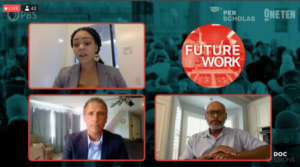
Earlier in September, one of our Hispanic learners on track to launch his technology career, Richard Escotto, was featured on CBS Sunday Morning. The feature focused on how many industries and labor markets are looking for employees following the pandemic and where those employees are working now. Richard Escotto mentioned that after he lost his restaurant job at the beginning of the pandemic, he decided to change career paths into technology. “[The pandemic] did give me an opportunity that was rare and probably was never going to happen, and sometimes you just have to seize that,” Richard reflected.

Richard Escotto is set to graduate from Per Scholas New York in October 2021 from our Cybersecurity course. Since the beginning of 2021, we have trained 300 Hispanic learners for our tuition-free tech training program, a growing number that Richard is happy to be a part of.
The Return to Campus Begins
After nearly a year and a half of remote training, virtual camaraderie, and reminding people they’re on mute, Per Scholas campuses began opening their doors to welcome our learners back to in-person learning in July. Complete with social distancing and health and sanitizing protocols in place, Cincinnati, Columbus, and National Capital Region were the first of our seventeen campuses to host our cohorts in-person. This is the start of our beginning steps as we roll out an initiative to re-introduce our learners, national staff, and campus teams on-site. Don’t think we will forget what we’ve learned from the pandemic, though; Per Scholas mastered the art of remote training and will continue to use it to reach more individuals moving forward.
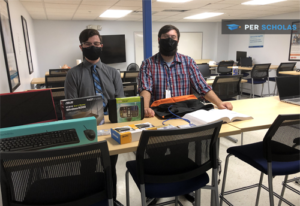
The return to campus for our learners is an experience that won’t be taken for granted as we continue to monitor the health of those returning, wear masks, and provide sanitizer for all. If there is one thing the pandemic and remote training taught us, it is that the resiliency of our learners and campus teams is unparalleled. We know that our learners can take on anything—we’ve seen that from the many challenges learners overcome before even arriving at Per Scholas, throughout in-person training (pre-pandemic), and in the initiative and resilience everyone showed both when we went remote and now as we return to campus.
While it may have been great logging into Zoom from the comfort of home and wearing sweatpants as the bottoms of our professional attire, there is absolutely nothing that compares to the interaction and experience of in-person training at Per Scholas. Per Scholas Cincinnati Managing Director Jay Dierig reflected that since returning, “Being back on-site has been a great experience for both our staff and learners. With tremendous effort and innovation, we made the pivot to deliver our courses in a remote environment, but there is nothing quite like the interaction, hands-on learning, and sense of community we can create with in-person experiences.” Just as our learners will pave the way in the tech industry once they graduate, they will now pave the way for our organization as we transition back in-person for our national staff as well.
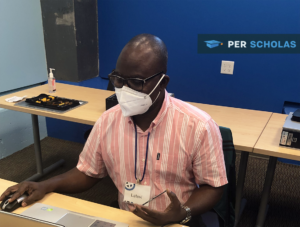
The morale that in-person training has created is second to none after being virtual since March 2020. Jay Dierig has noticed that the learners and campus teams are thrilled to be back as they build career paths in technology and advance economic mobility. “I’m delighted to be back in our beautiful building at Citylink and love to see the look of excitement on the faces of our learners each morning,” Jay mentioned. “Providing a safe, inclusive, and inviting environment for our staff and learners will continue to be our top priority.”
As we continue to welcome smiling faces back into our campuses across the country, we are eager to connect our diverse and skilled learners with leading businesses just as we have for the past 25 years. We’ll all miss reminding our colleagues they’re on mute at least once a day, but we think the trade off is worth it.
Growing to Train More Learners Nationwide
In June, Per Scholas made waves and became a greater source of technical training and career development through several important partnerships, recognitions, and collaborations. With such opportunities to grow and be recognized for the work we are doing to connect skilled individuals that were previously underrepresented in the tech community, our reach is set to grow in the coming months and years.
We’re humbled by growth capital investment from The Studio @ Blue Meridian, an initiative by Blue Meridian Partners, which provides social sector organizations flexible resources so we can test, iterate, and refine our model in order to accelerate readiness to significantly scale. Blue Meridian joins Lever for Change and other critical supporters in powering Per Scholas’ growth to 10,000 learners per year by 2025.
With our Champion Partner, TEKsystems, we graduated our first in-person training since the pandemic began! Learners in New York completed a new customized Low Voltage Technician training program developed specifically for TEKsystems’ career opportunities. We also hosted graduations in Detroit, Chicago, Boston, and Pittsburgh, resulting in over 75 trained Java Developers and Desktop Support skilled workers, ready for full-time employment.
Per Scholas was named a talent developer by OneTen, a coalition of leading executives who are working to change the approach to recruiting, hiring, advancing and promoting talent to put skills first. Our mission to advance economic equity through rigorous training for tech careers and connecting skilled talent to leading businesses goes hand-in-hand with OneTen’s vision to upskill, hire, and advance one million Black Americans over the next 10 years. “We look forward to having Per Scholas join us as an endorsed talent developer to support us in our mission to hire and advance one million Black talent in the next ten years,” said Maurice Jones, Chief Executive Officer of OneTen. “This effort will require a high functioning, multi-disciplinary coalition from corporate America, talent developers, Black talent, talent supports, and others, and it is crucial we have high quality partners like Per Scholas on that team. We are grateful for the work they have already done and are excited to partner with them going forward.”
In June, we also celebrated the launch of a new New York Satellite Partnership Initiative, removing barriers to better train learners across New York City. Per Scholas New York Managing Director Abe Mendez joined Staten Island Borough President James Oddo to announce this exciting expansion, which will begin to train Staten Islanders in-person through a partnership with the Staten Island Jewish Community Center this fall.
We are proud to again receive a 4-star rating from Charity Navigator, recognizing our organization’s commitment to industry best practices. We are also honored to be awarded Guidestar‘s Platinum Seal of Transparency for nonprofits, a recognition we are extremely grateful to receive. These awards and recognitions enable us to build trust with our partners and learners. Because of this trust, we are confident we will be successful in continuing to train and upskill underrepresented individuals for thriving careers in America’s tech workforce, achieving our goal of providing free tech training to more than 3,000 learners this year and growing to 10,000 learners annually by 2025.
1,000 Careers Update – Learners are Excelling Because of You!
Dayna and Sadaf are two of hundreds of Per Scholas learners who received tech toolkits as part of our 1,000 Careers Campaign.
Dayna Thomas Tucker, a Per Scholas learner, has personally benefited from the Raspberry Pi toolkit she received. The working mother of two has had a passion for technology and computers since she was young and would work on computers in school to try to figure out how they worked.

We recently connected with Dayna, who reflected, “I received the Raspberry Pi toolkit and gave me access to hands-on experience that I needed. The Raspberry Pi is Linux based and Linux was not something that I was used to. I had to rely solely on commands and learn codes. It was an interesting and fun way for us to learn a new system that was not like my Windows computer. It was definitely something different, but a great experience for someone like myself that has never worked with that type of system before.” Dayna is currently completing her End User Desktop Support training and is set to graduate in June with her eyes set on a technology career.
Another example of how these tech toolkits and laptops assisted in our learner’s success is that of Sadaf Haroon, who received a Macbook for her training. Sadaf obtained her Bachelor’s Degree in Computer Science originally, but had a gap in her employment once she became a mother. Eager to return to the industry, she looked into Per Scholas’s training as a way to get back and freshen up her skills.

Now a Software Engineer at AT&T, Sadaf initially received multiple job offers within a week of graduation and mentioned how her training and career development at Per Scholas connected her with her current position. Sadaf, an immigrant mother of three, was at first intimidated to resume a career in a thriving field as Tech. “Per Scholas made it easier for me to learn and now I am an earning member of my family. What can be greater than that?”
When we had the chance to chat with Sadaf, she shared, “It was a great initiative to provide the laptop. I was able to keep up with online learning and materials covered in my course since the computer came equipped with everything I needed that was up to date according to the program. It was also exciting to pick up the device and meet according to CDC guidelines.”
The impact of these toolkits is clear – enabling hundreds of learners to pursue training and open doors to high-growth careers in tech.
The Importance of Mental Health & Ways To Take Good Care
Per Scholas learners benefit from our Learner Support Team’s assistance to build wellness, wealth, and work rhythm through collaboration, strategy share, and skill-building through events designed with learners at their core. In recognition of Mental Health Awareness month, we are highlighting the many ways our Learner Support Team serves and supports our learners nationwide, including insight from one of our own, Serge Mavuba.
Just as Serge began his training, he experienced a life event that was daunting to his mental health. Unsure of how to continue with his coursework paired with these new thoughts and emotions, he turned to our Learner Support Team, who was able to help him balance his course load and share several coping mechanisms. Serge reflected, “mental health wasn’t discussed in my culture; it was taboo. I didn’t know what I needed, but with the Learner Support Team, I was able to recognize my triggers and implement ways to redirect my emotions to push through the day.” He was able to help himself by seeking help and sharing his thoughts with others, one of the ways to address mental health.
Wellness workshops series focuses on examining what wellness means for our learners, exploring self-care tools, and building a reflective professional practice. We facilitate weekly workshops to address stress and time management, test anxiety, and managing Imposter Phenomenon. Our learners are also involved in other activities such as Learner Lead Coaching sessions, where they become the experts and work in coaching sessions structured around goals and building strategies to achieve those goals, and listening groups in which learners hold space to reflect and reframe, supporting learning through stress, grief, and bereavement.
The Importance of Mental Health
According to the CDC, when we talk about Mental Health, we are talking about our emotional, psychological, and social well-being, all of which affect how we think, feel, act, handle stress, and make decisions. It is also important to note that poor mental health does not equal mental illness.
Our Learner Support Team shares that when we take care of our mental health and build wellness, our lives benefit in several ways. We see the benefits of improving our mental health in different aspects of our lives, including improving resiliency, building a growth mindset, and having energy and clarity to participate in our life fully. We can also handle and work through stressful situations, strengthen our relationships, achieve our goals, and thrive.
How Can You Take Care of Your Mental Health Today?
You can start taking care of your mental health with basic and simple activities, some of which might already be part of your daily routines. We’ve developed this list of 5 things you can start today to improve your mental health.
Check your physical needs.
Have you drunk enough water today? Did you forget to eat lunch again? These two very simple yet important activities have a strong impact on our mental health.
Stay Hydrated
Studies have shown that our brain needs water to eliminate toxins and dead cells and balance its chemical processes. By staying hydrated, you are helping your brain to regulate your stress and decrease anxiety. They’ve also shown that those who drink more water are often happier and mentally healthier than those who don’t.
Listen to your body to know when you’re dehydrated. Symptoms include dry mouth, sleeplessness, headaches, and irritability, among others.
Stay Fueled Up
We’ve all been there, rushing in the morning and missing breakfast or staying so busy we don’t eat lunch. Skipping a meal doesn’t sound so relevant to mental health, but it’s proven that skipping a meal like breakfast is related to being stressed or depressed. While missing one sporadic meal may not be so harmful, constantly skipping meals can affect not only your physical health but your mental health as well. A balanced diet is also essential. Try to stay away from highly processed foods that can increase your anxiety and instead look for whole foods with fiber, grains, fruits and vegetables, clean proteins, and more.
Pause and Practice Deep Breathing
Breathing is a powerful tool that helps to bring our body back into balance when we are feeling stressed or overwhelmed.
Breathe
Try using the 4-7-8 method by following these steps:
- First, let your lips part and relax your jaw. Make a whooshing sound, exhaling completely through your mouth.
- Next, close your lips, inhaling silently through your nose as you count to four in your head.
- Then, for seven seconds, hold your breath.
- Make another whooshing exhale from your mouth for eight seconds.
- Practice this pattern for four full breaths.
- Repeat as you’d like.
Reflect
Taking a few minutes of our day to reflect on how we feel and asking ourselves why is highly beneficial for our mental health. Our feelings, thoughts, and worries need a place to go that is outside our heads. You can try a practice like journaling, which is a tool that allows you to express yourself freely and helps you improve your anxiety, reduce stress, and boost your memory by clearing all the mental clutter. You can start writing freely, but if you don’t know where to start, our Learner Support Team suggest writing down the answers these questions:
- What is something I accomplished today?
- How do you want to show up today?
- What do you want to learn, how do you want to grow?
- How do you define joy?
When journaling, it is important to know that punctuation, grammar, spelling, or making sense doesn’t matter. Start with a word or sentence. Just write.
Take a Break
Taking a break is proven to be beneficial to decrease stress and improve mood and productivity. Our Learner Support Team recommends it as well. Give yourself permission to take a break, go outside for a quick walk, take a dance break, or connect with a friend. Breaks allow us to refocus, reflect, and regain the mental and physical energy we need to keep going.
Talk to a Professional
Our learners have the opportunity to connect with our Learner Support Team to find a therapist near them. It is essential to ask for help when needed. A therapist or counselor can help improve your mental health, support emotional distress, and develop the necessary skills to cope with difficult situations. Speaking to a therapist is not something we should be afraid or ashamed of doing.
We encourage you to take care of your mental health because it is just as important as your physical health. Mental health is essential no matter how old or young you are. We need to increase awareness of mental health and eliminate the stigma around it so that more people feel comfortable asking for help. As our learner, Serge, mentioned, “don’t be afraid; there is no shame in your story. I am here because someone else shared their story and showed me there is a light at the end of the tunnel. My experience at Per Scholas with the Learner Support Team has been life-changing.” Taking care of your mental health can lead to living a better life.
If you or someone you know is going through a hard time and having suicidal thoughts, call the National Suicide Prevention Lifeline at 800-273-TALK (8255) or 911 immediately.

